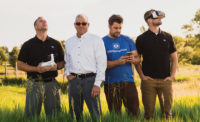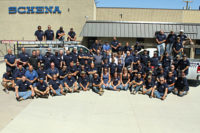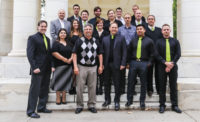Dynamic Duo: Friendship Fuels the Roofing Business Partnership at Ramon Franklin

Paul Ramon and Michael Franklin teamed up to form Ramon Franklin LLC. Recent projects include White Rock Branch Library, River Crest Country Club, North Richland Hills Recreation Center and the Legacy Emergency Room & Urgent Care. Aerial photos by Aerial Photography Inc. Photos by Geno Loro.




The owners believe the Ramon Franklin’s fully automated sheet metal shop and experience with all types of metal roofing give it an edge when bidding complicated projects.







Paul Ramon and Michael Franklin have been friends since they met each other in middle school in Fort Worth, Texas. They both entered the roofing industry about the same time and pursued different career paths. Ramon excelled in steep-slope slate and tile work, while Franklin focused on commercial flat roofing and architectural metal. They decided to pool their resources and expertise to form Ramon Franklin LLC, a contracting firm specializing in commercial, industrial and high-end residential projects. Today the Fort Worth-based company has 50 employees and a track record of successful growth, topping its sales numbers every year. The company is a member of National Roofing Contractors Association (NRCA), Midwest Roofing Contractors Association (MRCA), North Texas Roofing Contractors Association, (NTRCA) and Roofing Contractors Association of Texas (RCAT). Ramon is the past president of RCAT.
“Michael and I grew up together,” Ramon recalled. “Our friendship goes way back. We both got into the roofing industry at an early age. Michael actually got into the roofing business before I did, and dragged me and his brother along for the ride with him.”
“Paul and I got into the roofing business around the same time — back in 1990,” said Franklin. “As Paul concentrated more on the tile and slate market, I decided to pursue the commercial and metal market. In 2009, we discussed becoming partners and combining our knowledge. We decided to come together and start the company we continue to build today.”
Franklin earned an accounting degree in college, doing roofing work during the summers. “After my freshman year in college, a friend of mine whose dad was a general contractor was looking for workers,” Franklin recalled. “He needed some help with estimating and measuring roofs, and my friend asked if I wanted to do it over the summer. I was good at it and stuck with it.”
Ramon joined Franklin selling residential roofs while he attended college. Eventually Ramon decided to start his own residential company, Ramon Roofing Inc., which he still runs today. But he always kept tabs on his friend.
Franklin cut his teeth on residential roofs, then went to work for a large commercial roofing contractor. The two friends even worked on some projects together. One night they discussed the idea of becoming partners. “We thought, ‘This could work,’” Franklin remembered. “With his extensive background in tile and slate and my extensive background in low-slope roofing and sheet metal, we thought it would be a good combination.”
The relationships they had built over the years were an essential component in launching their business, noted Ramon. “We’ve been in the industry so long, and we’ve been building up relationships with a lot of people,” he said. “When we combined forces and formed this company, those relationships really helped us out, and they continue to do so — all the way from distribution to manufacturing. We thought it was a good idea, and it was. I’m very proud of what we’ve accomplished.”
“This company that we formed is more than just a roofing company for us,” Ramon continued. “It’s a part of life. We’ve put something kind of special together.”
Seeking Out Tough Projects
“When we started the company, the country was still in a recession,” said Franklin. “Fortunately, in Texas we were somewhat shielded from some of the effects of a tough economy, unlike other parts of the country. We worked hard to prove ourselves.”
“The first job we ever did was a retrofit of an old Quonset hut that was being turned into an office building for an investment firm,” Ramon remembered. “It was a neat building in an area that was being redeveloped. Our knowledge of standing seam was essential, as we put on 10,000 square feet of curved standing seam. We got a lot of attention for that.”
Things started to click, and they landed some bigger jobs, including the Trinity Valley School project in Fort Worth in 2012. The $2 million project called for replacing an existing synthetic slate roof with a product from Ludowici tile called LudoSlate.
“We got invited to be one of four contractors to bid the Trinity Valley School Campus re-roof,” Franklin said. “The project had a very tight schedule, and we had a strategic sit-down meeting and outlined our specific plan to get the job done on time. We went in with a schedule and specifically focused on production. They are very proud of their campus, and we had a detailed plan to protect the grounds. We had a plan — and our plan worked.”
The company completed the 230,000-square-foot project over a tight window in the summer, removing the old roof and installing the new one in nine weeks. “We had to take it all off and put it back down in very short amount of time,” said Ramon. “I won’t say I wasn’t nervous at any point in time, but for me — and I’m sure Michael feels the same way — there was a tremendous feeling of accomplishment when we finished that job. There were a lot of challenges on that project.”
Challenges included difficult access, which necessitated double and sometimes even triple handling of the debris during the tear-off. They also had to ensure they protected against any damage to the landscaping and get the building in the dry as soon as possible.
Scheduling and coordinating the manpower was also a big hurdle. “We basically had 12-24 guys there all the time, the majority of it in the high side,” said Ramon. “We had to work around a lot of things there, but we got it done, we performed, and they were very happy.”
Recent projects include Legacy ER & Urgent Care in Allen, Texas. The project received the 2014 Chairman’s Award for Overall Excellence from the Metal Construction Association (MCA) at METALCON. The metal roof system features Rheinzink standing seam metal panels, as well as tapered metal panels and soffit panels with multiple perforation patterns. “It has been described as ‘metal origami,’” Franklin said. “It was a very difficult job.”
The company’s metal experience paid off, as it was able to make some changes as the project progressed. “The key was having a superintendent on the site who was very knowledgeable with zinc, and understood layouts and directional changes — and had a great deal of experience with standing seam and metal panel systems,” Franklin said. “There was a little bit of reframing necessary, and it was a technically difficult project, but in the end, it was worth it.”
The company features a fully automated sheet metal shop. Franklin notes the company is committed to investing in cutting-edge technology to get the job done better, faster and more efficiently. “If there is a tool, piece of equipment or new technology out there that helps our guys do the job better, complete the job quicker and eliminate worker error, that’s where we’re going,” he said. “We’re committed to investing in our company, including purchasing the most advanced sheet metal equipment and robotic welders.”
Franklin believes the company’s ability to tackle a wide range of roofing systems gives them an edge. “One of our real strengths is diversity,” he said. “We have a lot of knowledge on a lot of higher-end roofing systems.” The company is a certified applicator for Sika Sarnafil, Carlisle, Firestone, GAF, Rheinzink and VMZinc. It’s also certified with the Tile Roofing Institute.
According to Ramon and Franklin, clients like the company’s ability to tackle projects with different elements, such as flat roofing combined with metal and/or slate. “General contractors and owners are able to package up all these various scopes and write one contract,” said Franklin.
Projects with multiple scopes of work account for more than half of the company’s projects, according to Franklin. “The harder jobs seem to find us,” he said. “We have the knowledge, the diversity and the experience with different types of materials and installation methods.”
This knowledge allows them to spot potential problems and head them off — such as technical details that don’t match existing conditions. “Sometimes young architects today will just copy and paste,” Franklin said. “They aren’t getting out in the field and seeing how things are built. If there is an error in a detail, we can and often do help with corrections.”
Focusing on Communication
Asked about key challenges in their market, Ramon and Franklin point to the labor force. “It’s harder and harder to find trained workers,” said Ramon. “That’s a challenge that will continue to get greater as we go on in Texas.”
Communication on complicated construction projects is always a challenge, especially when there is a language barrier. Ramon notes that the company tries to hire supervisors who are fluent in English and Spanish, and Ramon speaks Spanish as well, which helps him get the message across to the entire company. “When you can learn somebody’s native tongue, it’s amazing how much more you can get out of it and how much more you can learn together,” Ramon said. “I am Hispanic. I speak Spanish, and it helps. People are more comfortable speaking their native language.” “
Franklin added that the company focuses on ongoing training for all of its workers. “We try to send our key employees to all of the training seminars and lunch and learns,” he said. “Any time there is new video out, we try to take advantage of it. It’s a challenge. Sometimes there just aren’t enough hours in the day.”
Training is essential to quality workmanship. “Eighty percent of our jobs require a manufacturer’s no dollar limit (NDL) warranty,” noted Franklin. “The jobs are being inspected by the manufacturers’ technical reps. We work closely with the reps and have daily meetings, daily reports and daily punch lists. Foremen report on the progress and include pictures of the job in progress. We make sure our project managers visit the jobsite. We always say, ‘Inspect what you expect.’ We stay on top of it.”
The company also makes sure the customer is satisfied. “We stay in contact with the customer,” said Franklin. “The owners, project managers and superintendents all keep in touch with the general contractor, owner, or facility manager on site.”
The company’s software system helps coordinate daily reports complete with photos. “We are constantly trying to improve our software and systems and become fully automated,” said Franklin.
Each day at the jobsite begins with a job hazard analysis meeting tailored to that day’s specific tasks. “Number one, we provide them with the full fall protection they need and the perimeter guardrails that they need,” said Franklin. “It’s a constant challenge.”
Ramon noted the company uses a third-party safety consultant to ensure everything is done according to regulations.
The company continues to expand, and future plans include moving to a larger space and adding staff. Through it all, Ramon and Franklin remain good friends as well as business partners.
“It’s been great,” said Ramon. “We get along well. We respect each other. And we learn from each other. At the end of the day, we still enjoy the friendship that we have. We still hang out, and go out and do things beyond roofing, whether it’s dinner or a Rangers game together.”
“I always tell people that Fort Worth is a great, great city,” Ramon said. “I love this city, and Michael does, too. You couldn’t ask for a better place to have a business in because of all the support we have here. It’s a really cool place. Michael and I both grew up here, we have a great working relationship, and we’re happy to be a part of this great — and growing — city.”
Looking for a reprint of this article?
From high-res PDFs to custom plaques, order your copy today!











